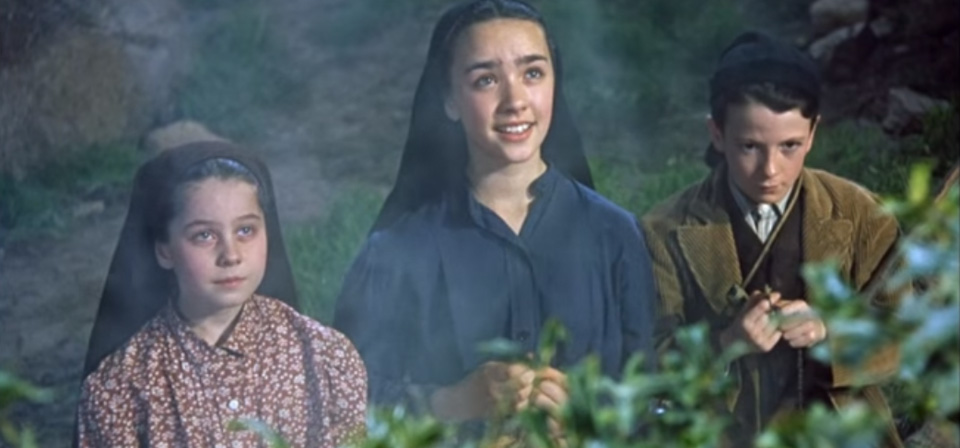Reviews
The Shoes of the Fisherman (1968)
Fascinating despite flaws, The Shoes of the Fisherman is impossible to watch first of all as a movie. By a strange twist of chance or fate, it demands to be viewed as a curious, at times almost prescient anticipation of the reign of John Paul II, filtered partly through the lens of the Silly Sixties.
The Nun’s Story (1959)
The Nun’s Story certainly doesn’t offer the positive depiction of religious life common in 1950s Hollywood, but it’s not an anti-religious or anti-Catholic depiction either.

The Miracle of Our Lady of Fatima (1952)
Old-fashioned, reverent, basically faithful to the facts, The Miracle of Our Lady of Fatima never quite emerges from the shadow of the earlier, superior The Song of Bernadette, but it ups the ante with sterner opposition (militant Marxists rather than freethinking civil authorities) and a more dramatic climax.
Ice Age 2: The Meltdown (2006)
Ice Age 2 isn’t really a meltdown, but it’s no bolt from a Blue Sky.
Pride & Prejudice (2005)
This is no slight to the BBC miniseries; its glory is precisely its wonderfully literary quality. By contrast, the 2005 film is wonderfully non-literary. The BBC miniseries is peopled with living, breathing characters; the 2005 film is peopled with living breathing human beings. This is not to diminish the definitive achievement of the BBC miniseries, but to appreciate the freshness of a retelling that does something new.
C. S. Lewis: Beyond Narnia (2005)
Starring Anton Rodgers as an avuncular Lewis at home in Oxford in 1963, the year that he died, the short film cuts between Lewis’s running commentary on the events of his life and flashback dramatizations of those events.
Inside Man (2006)
Inside Man opens with a challenge from criminal mastermind Dalton Russell (Clive Owen) to the viewer to try to keep up as he lays out the labyrinthine details of his perfect crime. “Pay strict attention to what I say, because I choose my words carefully, and I never repeat myself,” he warns with smug complacency.
The Ten Commandments (1956)
For good and for ill, it’s as much a testament and a fixture of traditional American ideals and affections as a courthouse display of the stone tablets, and as weighty and solid.
V for Vendetta (2006)
Fans and philosophy students endlessly debate whether the world of The Matrix is most influenced by Eastern mysticism or Cartesian philosophy, Christianity or gnosticism, humanism or post-humanism. No such debates will be occurring over V for Vendetta, which weighs down what could have been a thought-provoking dystopian scenario with leaden specificity and sanctimonious ideo-political commentary.
Crash (2005)
Crash is a provocation, an insistent manifesto that filters every scene and almost every line of dialogue through the prism of race, but keeps turning the prism around and around until the colors no longer matter and we see only what the characters do.
The Prize Winner of Defiance, Ohio (2005)
The ongoing Hollywood deconstruction of Eisenhower-era American values hits a speed bump of sorts in The Prize Winner of Defiance, Ohio, a whimsical, stylish tribute to the wit and inner strength of a Donna Reed–esque housewife and mother of ten (Julianne Moore) whose bouyancy and creative flair holds her family together in spite of little help and indeed much resistance from her alcoholic, bullying husband (Woody Harrelson).
Kind Hearts and Coronets (1949)
In Kind Hearts and Coronets, the driest, darkest, and arguably the best of Ealing Studio’s acclaimed British crime comedies, murder itself is a trivial offense compared to punctilious observance of the highest standards of Edwardian social rectitude, at least for the aristocratic protagonist, Louis Mazzini (Dennis Price), or Lord d’Ascoyne as he is styled after ensuring the deaths of each of the eight relations who once stood between himself and the peerage.
Tsotsi (2005)
Tsotsi seems almost entirely severed from human values, and his seemingly total moral apathy rattles the conscience-stricken Boston. “Decency, Tsosti,” Boston harangues. “Do you know the word?”

Sophie Scholl – The Final Days (2005)
Sophie Scholl is one of a very few films that accomplishes one of the rarest and most valuable of cinematic achievements: It makes heroic goodness not just admirable, but attractive and interesting.
Eight Below (2006)
If Snow Dogs is a fairly typical example of the conventional Hollywood idea of a live-action family film, Eight Below is a typical example of a new trend in family films that includes National Treasure, Hidalgo, Two Brothers, Fantastic Four and The Legend of Zorro. This is a good thing, but not yet good enough.
Young Mr. Lincoln (1939)
Henry Fonda’s best-known performance as a legendary historical character in a John Ford film is, of course, as Wyatt Earp in My Darling Clementine. Yet Fonda was more aptly cast, and gives a more vivid performance, five years earlier in their lesser-known first collaboration, Young Mr. Lincoln.
The Awful Truth (1937)
One should be rooting for Cary Grant to get the girl, which means he ought to deserve her — and if that’s more or less the case here, well, it’s only because the girl turns out to be no great shakes either.
His Girl Friday (1940)
Call me an Albany-living mama’s boy, but when Hildy tells her male colleagues in an early scene that she’s going to be a woman, not a news-getting machine, and have babies and take care of them, and give them cod-liver oil and watch their teeth grow, and not have to worry any more about crawling up fire escapes, getting kicked out of front doors, or eating Christmas dinners in one-armed joints — well, I for one think that sounds kind of nice.
The New World (2006)
Up to a point, there is a level of artistic kinship between The New World, Terence Malick’s dreamlike origin myth of the American colonies, and another recent, visually poetic meditation on a foundation story: Mel Gibson’s The Passion of the Christ.
The Wild Parrots of Telegraph Hill (2005)
The Wild Parrots of Telegraph Hill is the third intriguing nature documentary of 2005, a charming sleeper hit that focuses like March of the Penguins on the life challenges faced by a population of exotic birds, and also, like Grizzly Man, on an eccentric California man’s intimate involvement in their lives.
Recent
- Benoit Blanc goes to church: Mysteries and faith in Wake Up Dead Man
- Are there too many Jesus movies?
- Antidote to the digital revolution: Carlo Acutis: Roadmap to Reality
- “Not I, But God”: Interview with Carlo Acutis: Roadmap to Reality director Tim Moriarty
- Gunn’s Superman is silly and sincere, and that’s good. It could be smarter.
Home Video
Copyright © 2000– Steven D. Greydanus. All rights reserved.